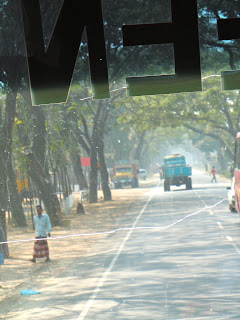It’s hard to find a way of describing my emotions on
experiencing this strange country. I’m soaking it all up like a sponge but words like aargh, oooh, wow, noooo and the like don’t really do it,
do they? Anyway……
The four-day field trip with my eight other VSO volunteer
colleagues was to Khulna in the rural south-west, the poorest, most isolated
area. In geographical terms Bangladesh sits on one of the largest river deltas in the world formed
by the confluence of the Ganges and the Brahmaputra rivers. In total the delta
has over 57 rivers emptying into the Bay of Bengal. So the area is very fertile
when it’s not underwater. Although this area gets its flooding from the sea the main flooding, by the way, comes not from the sea
but from the north of the country when the Himalayas melt and the flooding river water
sweeps through the country.
What I find so gob-smacking is that Bangladesh is only the
size of England and Wales combined but has over 160 million people. No wonder
the place is teeming with people wherever you go. Khulna district is very isolated but actually
the distance we travelled was less than 85 miles door to door (only slightly further than London to Birmingham. It took ten
hours on a coach. Apparently that was good going. Leaving Dhaka we passed through one of the seven circles of hell - the brick factory area. The photo below doesn't look too horrific but the blurry-ness is due to the pollution the chimneys give off. The men working in the kilns have hellishly hard jobs and are, of course, underpaid and overworked. In today's newspaper there was an article about child trafficing into the brick factories. The police had rescued 23 kids aged under 10 who had been forced to work long long hours loading and unloading the kilns. Not for the first time - or probably the last - I'm saying to myself 'we don't know how lucky we are'.
After an arduous journey including a ferry crossing, which was an experience in itself, we arrived in Khulna district. I’ll attach some photos showing
the journey.
The south-west is so beautiful. Very flat, very green. As far as the eye can see, there are copses of tropical trees surrounded by rice
paddies edged by raised levees or dykes topped with little footpaths lined with banana trees or pumpkin or tomato plants. The roads are mainly made of
dirt and even the 'main' Dhaka to Khulna road only had tarmac for about half the
way. The tracks off the main roads are shaded with beautiful trees and often
paved with brick cobbles laid herringbone style. Apparently the last government
launched an initiative to do this throughout the country but the latest
government cancelled it. Shame to stop as it’s obviously made a huge
difference. I was there in the best season as half the year this area is flooded
to the top of the levees and often ankle deep on the footpaths and in the
village hamlets.
The flooding is particularly bad in this area as it is saline and therefore ruins everything. Pumped 'drinking' water
comes from Tube Wells which take the water from the low water table but the
salinity increases every year and it also contains arsenic. The locals drink
this, washing themselves and cleaning clothes and cooking utensils in the pond water. As you can
imagine the volunteers are strictly forbidden from drinking, teeth cleaning or washing
in the local water. Even the filtered water is bad and those that have ignored
the warning not the wash in it have come out in rashes and had significant skin
problems.
Enough of the geography lesson. More on the people later.
Main road from Dhaka to Khulna - showing tarmac!
One of the hundreds of brick factories.
Not quite Dover - waiting for the car ferry
Restaurant on the ferry - and no, I didn't sample anything
Ships that pass......
View from my hotel room - it's morning mist mixed with an unhealthy dose of pollution
Meeting local women on the track between two village hamlets










No comments:
Post a Comment